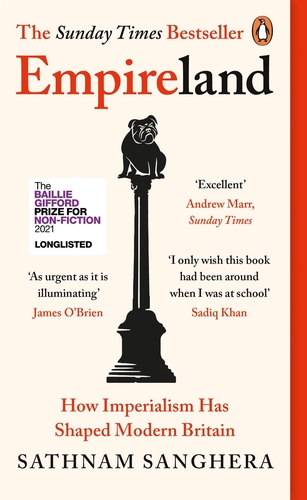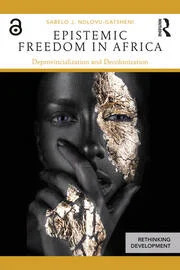When I learned history at school, it was all about European royalty and battles from the distant past. This was in the 1970s when Britain was an even more overtly racist country than it is now. Yet I learned nothing about the British empire, or about other empires either. At least not from my lessons; what I learned about the British empire, I learned from the fiction I read.
My father took care to provide diverse reading for me, including books by African and Caribbean authors, and Enid Blyton’s books were banned from our house because of their overt racism and sexism. But a number of other authors whose work had racist elements slipped through, such as Hugh Lofting, Willard Price, and Laura Ingalls Wilder. From these books, and from the wider culture around me, I learned that the British empire had been a great endeavour in which brave pioneers had travelled, and sometimes settled, in lands where no white man had ever been. This was a heroic narrative involving encounters with ‘the other’, i.e. black and brown people, who were generally either hostile or servile. They were sometimes treated by the white characters with respect and kindness, but they could never, ever, be equal. The white people in the stories ended up richer in some way or another, and the black and brown characters were incidental to that story. The fundamental message was one of white superiority, whether on an individual, local, national or global scale.
I have written before on this blog about my own racism. In recent years I have been taking steps to educate myself about colonialism and its impacts. This mostly involved reading a bunch of books. As always with my book-related posts, I am not presenting this as any kind of exhaustive or authoritative list, but simply the books I have chosen to read.
The first book I read was Inglorious Empire: What the British Did to India by Shashi Tharoor. This is a dignified, scholarly, polite assessment of Britain’s looting and ravaging of India over 200 years from the mid-1700s to the mid-1900s. Tharoor builds his argument carefully, piece by piece, giving credit where it is – occasionally – due. He acknowledges that the English language was and is a valuable legacy for India (p 202). But he concludes, unequivocally, that ‘The India that succumbed to British rule enjoyed an enormous financial surplus, deployed a skilled artisan class, exported high-quality goods in great global demand, disposed of plenty of arable land, had a thriving agricultural base, and supported some 100 to 150 million without either poverty or landlessness. All of this was destroyed by British rule.’ (pp 219-20)
Then I read Slave Empire: How Slavery Built Modern Britain by Padraic Scanlan. This is written more like my school history books, with lots of names and dates. It focuses on slavery, primarily British slavery albeit in a global context, defining England as ‘among the world’s largest slaveholding powers and one of its most prolific slave traders’ (p 28). Scanlan covers the rise and the fall of the slave trade, and carefully documents how the official end of slavery did not in fact end ‘Britain’s entanglement with slavery’ as ‘British industry and finance remained deeply connected to enslaved labour’ (p 373).
Next came Empireland: How Imperialism Has Shaped Modern Britain by Sathnam Sanghera. Sanghera’s chatty journalistic writing style initially made his book seem like an easier read, but – unsurprisingly, given the subject matter – it was as demanding as the others. Sanghera, though, has a unique view in both directions. As a British Sikh, he has been on the sharp end of colonialism, but also had to face up to Sikh collusion in some aspects of colonisation, such as Sikhs’ participation in violently quashing the Indian rebellion against British rule in 1857. Sanghera describes facing up to this as ‘onerous’ (p 153) and acknowledges the possibility that the history of colonialism ‘is just too painful to digest’ (p 208).
I am grateful to Sanghera because I, too, find the process of facing up to this history to be onerous and painful. I realise that this may be seen as a form of ‘white tears’ – what right do I have to feel sad about a change to my national narrative when millions of lives were stolen? Yet I think if we do not acknowledge the potential and actual emotional impacts of this facing up process, we are effectively expecting people to learn about dreadful atrocities without any emotional consequences, and that is unrealistic.
Learning about this stuff is tough. It is also vital.
The next book I read was The New Age of Empire: How Racism and Colonialism Still Rule the World by Kehinde Andrews. Andrews demonstrates that the systems developed as colonialism was formed are still in action today. He also argues that we need to know about this because ‘The world can only ever be as equal as the knowledge it is built upon’ (p 2). Andrews asserts that ‘the premise of this book is deeply optimistic’ (p 205), but I have to say it didn’t seem so to me and I’m not sure how it could. The author does, though, express a hope that I share, which is that ‘understanding the scale of the problem and the limits of the solutions offered can spark a genuine conversation about how to overhaul this wicked system.’ (p 207)
Now I am reading Epistemic Freedom in Africa: Deprovincialization and Decolonization by Sabelo Ndlovu-Gatsheni. The author draws primarily on theoretical and research work from African, Asian, and south American scholars. He shows us, among other things, that not only lands and bodies but also people’s minds are colonized by the global dominance of Eurocentric thought and ideas. ‘Epistemic freedom is fundamentally about the right to think, theorize, interpret the world, develop own methodologies and write from where one is located and unencumbered by Eurocentrism.’ (p 3).
Although these books are justifiably angry, they are not polemics. Each engages with other structural inequalities such as sexism/patriarchy and class as well as racism, embraces nuance, and looks forward as well as back. Of course there is much, much more to each book than I have been able to explain here. I would recommend them all to anyone wanting to learn more about colonialism.
Ndlovu-Gatsheni’s book seems to me to be truly optimistic, perhaps because it offers a key to action I can take. It is easy to feel powerless in the face of colonialism, not least because that is partly what colonialism is designed to achieve. And for sure what I can do is only a minute fraction of what is needed. It is a truism that I can only do what I can do, but that truism is used too often to absolve people from the need to act. I think it is equally true that I should do what I can do. And what I can do – what I realise, now, I have been doing for years – is to encourage people towards epistemic freedom.
This blog and the videos on my YouTube channel are funded by my beloved Patrons. Patrons receive exclusive content and various rewards, depending on their level of support, such as access to my special private Patreon-only blog posts, bi-monthly Q&A sessions on Zoom, free e-book downloads and signed copies of my books. Patrons can also suggest topics for my blogs and videos. If you want to support me by becoming a Patron click here. Whilst ongoing support would be fantastic you can make a one-time donation instead, through the PayPal button on this blog, if that works better for you. If you are not able to support me financially, please consider reviewing any of my books you have read – even a single-line review on Amazon or Goodreads is a huge help – or sharing a link to my work on social media. Thank you!












 This post was requested by people in the Facebook group of the
This post was requested by people in the Facebook group of the  As you probably know, I am interested in
As you probably know, I am interested in